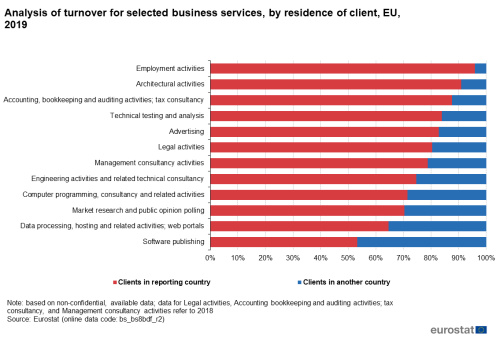Archive:Trade in business services
Data extracted in February 2022
Planned article update: 28 February 2023
Highlights
In 2019, about half of the EU sales by the software publishing sector were generated from clients residing in other countries.
In 2019, the EU employment activities sector recorded the highest levels of sales (95.9%) generated from clients residing in the reporting economy.

(% of turnover)
Source: Eurostat (bs_bs8bdf_r2)
Globalisation patterns in EU trade and investment is an online Eurostat publication presenting a summary of recent European Union (EU) statistics on economic aspects of globalisation, focusing on patterns of EU trade and investment.
The business services sector can be viewed as providing key inputs in the production of other goods and services. As such, it makes an important contribution to EU economy, promoting competitiveness and growth. The business services sector has expanded in recent years: this growth has been underpinned by the development of new services and more specialised tasks (including the management of supply chains and international production networks), but also reflects increased levels of outsourcing to external suppliers. These changes have provided a stimulus for the business services sector to become increasingly global in nature. Furthermore, technological changes have allowed smaller businesses to enter niche markets where previously they may have lacked the scale to trade internationally.
This article provides an analysis of the turnover (sales) of EU enterprises in the business services sector, according to the residence of their clients — information is presented for residents in the reporting country and for non-residents customers from another countries. The analysis is based on non-confidential data, disseminated in the Eurostat database.
Full article
Analysis of turnover for selected business services
In 2019, about half of the EU sales by the software publishing sector were generated from non-residents clients residing in another country
Figure 1 shows the proportion of business services turnover in 2019 by residence of the client. For each of the business services shown, a majority of the EU's turnover was realised by sales to clients from the reporting economy (in other words, from clients residing in the domestic economy). This pattern was particularly evident for employment services; architectural activities; accounting, bookkeeping and auditing activities; tax consultancy; technical testing and analysis; advertising and legal activities, where more than 80% of the sales were to customers in the reporting economy. Whereas clients resident in another country accounted for a higher share of total sales for activities such as software publishing services (46.7%) and data processing, hosting and related activities; web portals (35.3%). Such disparities may be linked to the tradability of various services, the different modes for trading services, or barriers to entry which prevent/restrict trade in some business services.
In 2019, 95.9 % of the sales made by EU's employment activities were to clients from the reporting country; by contrast, the percentage of total turnover accounted for by domestic clients fell to 53.3 % for software publishing activities.

(% of turnover)
Source: Eurostat (bs_bs8bdf_r2)
Ranking of the turnover generated by selected business services
In 2019, the EU computer programming services sector recorded the highest levels of sales generated from clients residing in another country.
Looking in more detail at developments across the individual EU Member States, Table 1 shows a ranking of the turnover generated by selected business services, according to the residence of clients. In 2019, German computer programming and consultancy enterprises recorded the highest value of business services sales to clients residing in another country (EUR 34.1 billion). The same activity — computer programming and consultancy — also accounted for the second, third, fourth and fifth highest value of sales, as made by Swedish, Dutch, Spanish and French enterprises. Aside from these, the other top ranked activities included engineering activities from German, Spanish and French enterprises whose turnover was ranked sixth, seventh and eighth, respectively. Regarding the value of turnover, those two sectors (computer programming and engineering) can be considered dominant in 2019.
While the rankings of overall turnover are unsurprisingly dominated by some of the largest EU Member States, the second half of the table 1 presents the percentage of the national sector's turnover that was generated by clients from other EU Member States. In 2019, 86.6% of the Finnish sales in software publishing activities and 85.1% of the Czech sales in the same sector were derived from clients residing in another country (Czech data refer to 2018). The next highest shares were recorded for Data processing, hosting and related activities in Lithuania (85 %) and software publishing in Belgium (83.7 %).
Source: Eurostat (bs_bs8bdf_r2)
Source data for tables and graphs
Direct access to
- Business services statistics (ESMS metadata file — bs_esms)